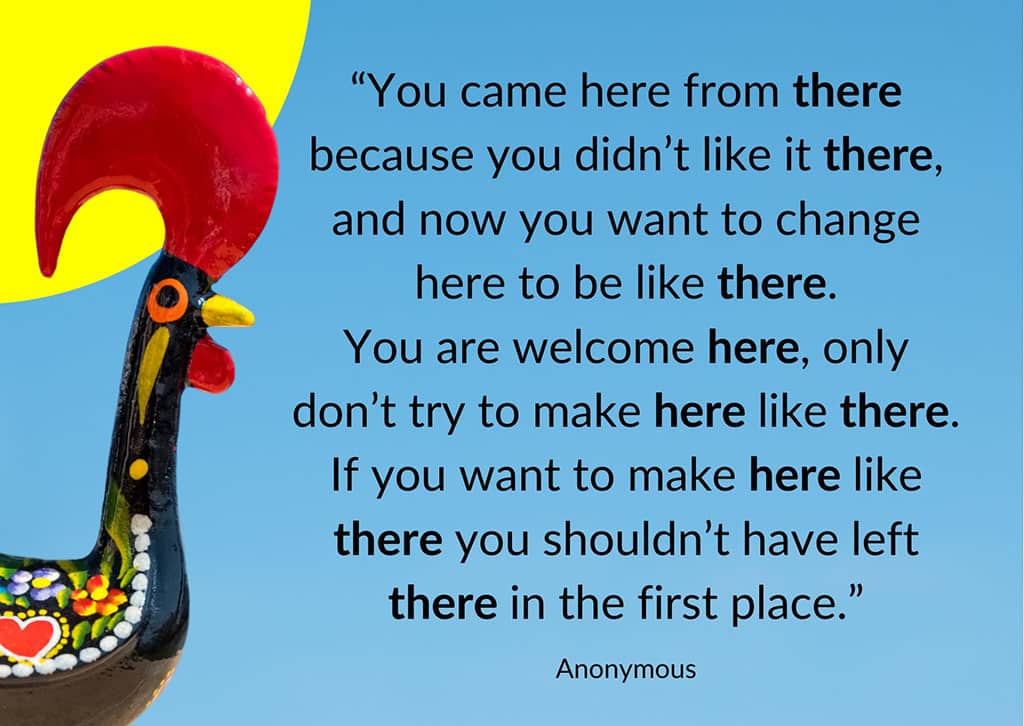Well, we’re safely past ‘Blue Monday’, that worst of all days in the year when a perfect storm of factors come together to make our lives a misery. It turns out that the formula put forward to bring our attention to how grim early January is in the Northern Hemisphere was contrived by a travel company hoping to sell more holidays to consequently depressed, and until that point possibly happy enough, bystanders.
The idea persists annually, however, despite being roundly debunked by the self-imposed protectors of truth and sanity, I suspect because it has its origins in post-Christmas blues, cold weather and tight finances, much of which can affect the strongest among us.
Should you need a shot in the arm, and by that I mean some inspiration, and not your 28th booster jab, stay tuned for what I offer in good faith – a guide to chase away any murky Monday-ness or an over-identification with the troubles of the material world.
This week, I give you an expat survival guide that can not only help you settle in but also act as a little ‘pick-me-up’ in those times with all the qualities of any Blue Monday or when you think to yourself: “God, what have I done?”.
And, by the way, I find it hard to imagine that anyone moving to a new country, even this fine place, will ever be free of such moments, more or less.
And just like the Blue Monday theory and formula, this guide has no scientific basis whatsoever. Yet I hope its intentions and practical value will win over the most rational of minds and exacting of critics. Some things are just obvious, aren’t they? And in the doing of them, despite the lack of a well-funded research team armed with a handsome budget and lab-full of tortured rats, we can see – and benefit from – some good, old-fashioned common sense.
Oh, and before we get started, I will go with the word ‘expat’ despite its triggering power for some people, who, in my opinion, have too much time on their hands that could be used being a force for good in the new society, rather than in vainglorious battles on the point-scoring, virtue-signalling theatres of war of social media. On second thoughts, that’s a whole new article in its own right, even if it might get me into so much more trouble.
Anyway, here goes with step one …
My quick ‘n’ dirty, yet from the heart, guide comprises three ‘C’s, the first of which is CONNECT.
As a social animal, which I believe you to be, and wherever you find yourself on the introvert to extrovert spectrum, I’d say connecting is crucial. Now, I could have said “learn the language”, but instead, I am going with ‘connect’. Learning Portuguese is, of course, a good idea, and a truly respectful course of action. But that said, I know people who have got the hallowed A2 certificate and rarely bridge the trans-linguistic gap, which I feel is more important than mere knowledge. A few key words and greetings, for example, go far further in your everyday life than a piece of paper that proves you went through a grammatical endurance test some years ago.
Similarly, a smile or genial, knowing nod will do more for your social capital – when used in the right situation – than memory-banked conjugations that never see the light of day. Be open, go with social flows and lower your guard (when safe to do so, which is most of the time), if you want to feel accepted and good to go for the long-term.
Funnily enough, I have just shaken the hand of a local man, who I only know from trading nods and the simplest of exchanges, over the last two years, in the café where I am writing today. We have connected and both seem happy to have that most basic of bonds.
The second ‘C’ is CREATE, by which I mean: have purpose in the community where you are building your life. I’ve spoken before about ‘peak-pastel’, where the custard-filled retiree one day thinks: “Is this it? What next?!”
Many find retirement is not what it’s cracked up to be, after the days turn into weeks and weeks turn into months of mooching; finding that so much of one’s identity and meaning is tied up in work, despite the bad memories of the workplace, and many of the people there who we worked so hard to put behind us.
It’s not that we necessarily need a job, especially if the money derived from it is no longer the challenge it once was. It’s that humans need to give of themselves and, deprived of such opportunity, whether by virtue of circumstance or geography, can lose vitality and joie de vivre. Haven’t we all seen this in others who’ve made this somewhat seismic, albeit longed-for transition?
Good for you then if you are now engaged in those hobbies that you delayed for years. And good for the world, and your new society, if your sense of purpose and meaning can find its vent in a win-win project for you and your new locality.
We can see this in those who join sports clubs, volunteer locally or adopt cats and dogs, for example. Connecting (first ‘C’) and creating, whether it be goodwill, value or happiness for others, clearly offer purpose and bring meaning, which are so important to the human animal, once our most basic needs have been met.
The engagement and fulfilment that my first two ‘C’s can bring lead nicely into the third, which, in some ways, is more a caution than a command. It’s a lesson I’ve had to learn myself, and a phenomenon that can cause me to wince when I see it active in the newcomer.
The ‘C’ of CURBING one’s enthusiasm is a check and balance on the connecting and creating steps that can make the difference between being genuinely useful and appearing downright patronising or condescending. There’s no doubt we all have a lot to give. Each of us is uniquely gifted, in my view, and blessed also perhaps, with useful insight and experience, especially the ‘mature’ among us.
So, for sure, be ready to share and get involved. But bring a mindfulness to your community contributions because you don’t get a second chance to make a first impression. Let’s, as incomers, offer and invite but not impose or overbear. And, wherever possible, integrate rather than be insular, breaking ranks with fellow countrymen and rubbing native shoulders, though not literally of course (see: offer rather than impose!).
Expat survival and success is a long game, best served cool rather than piping hot. How you present yourself and your ideas may be how you are remembered by locals years from now, so easy does it, and ideally without attachment to outcome, or indeed taking any rejection or indifference personally.
And one last point for well-meaning foreigners now keen to connect and create, albeit with enthusiasm appropriately curbed. Herewith a stiff, but useful caveat to foreigners keen to share that does the rounds in social media circles where the politics of integration are considered, which may be worthy of reconsideration here:
“You came here from there because you didn’t like it there, and now you want to change here to be like there. You are welcome here, only don’t try to make here like there. If you want to make here like there, you shouldn’t have left there in the first place.”
I have not been able to source the author of these great words but suggest this will form an effective psychological and social safety net if taken to heart and earnestly observed.
And with these words, go connect and create with careful consideration, friend. And let me know what wonders you are creating here in our new home that might be an inspiration to others …
Contact Carl with any positive projects in Portugal at carl@goodmorningportugal.com
Carl Munson is host of the Good Morning Portugal! show every weekday on YouTube and creator of www.learnaboutportugal.com, where you can learn something new about Portugal every day!
















